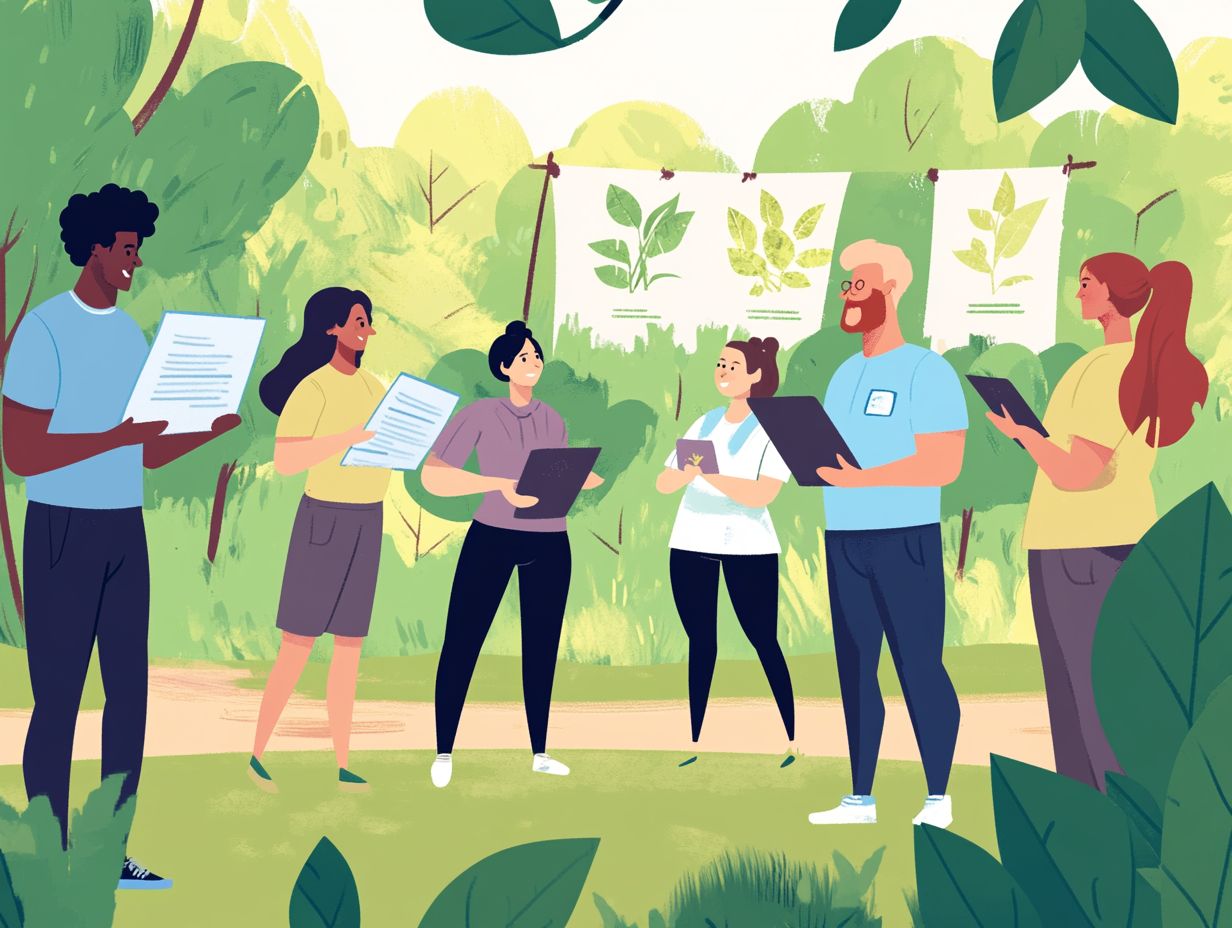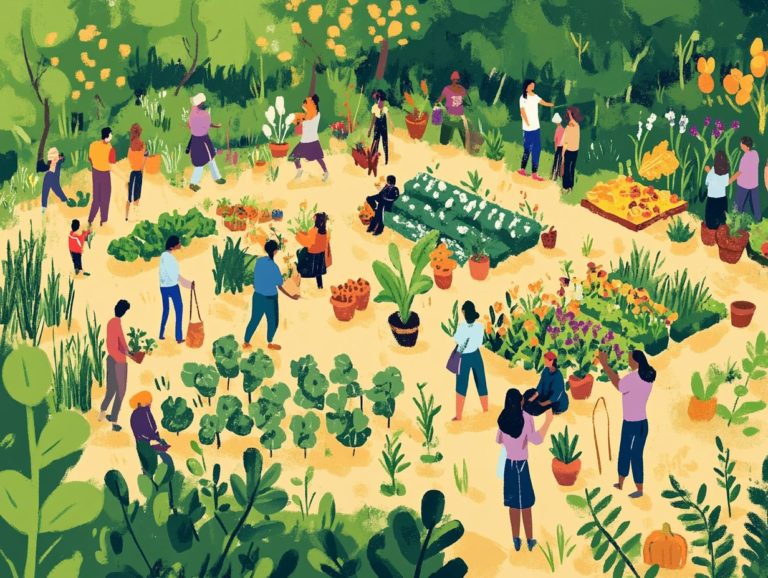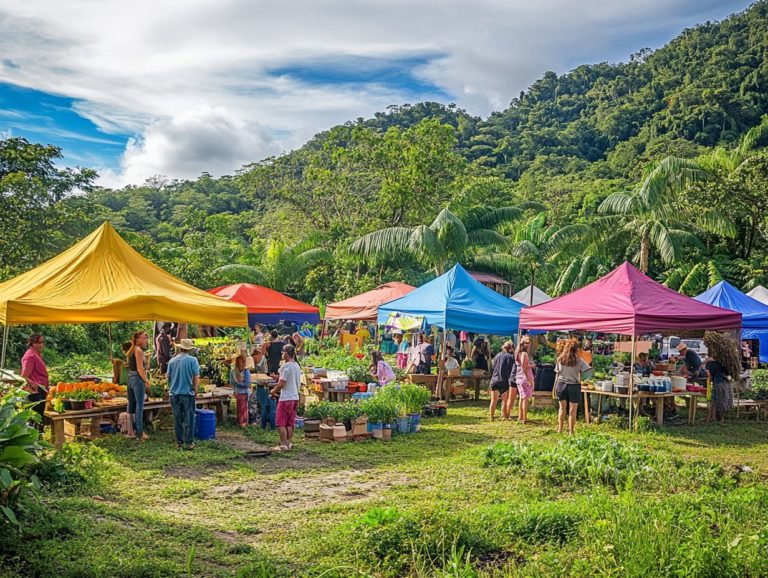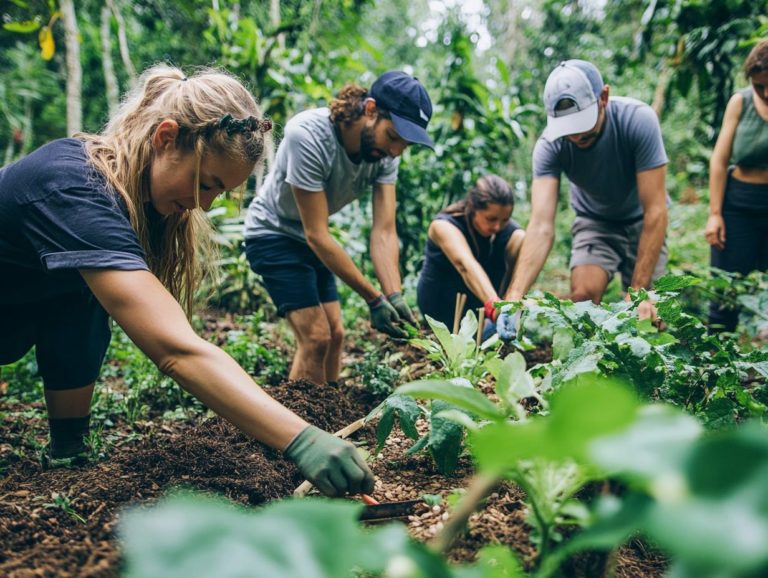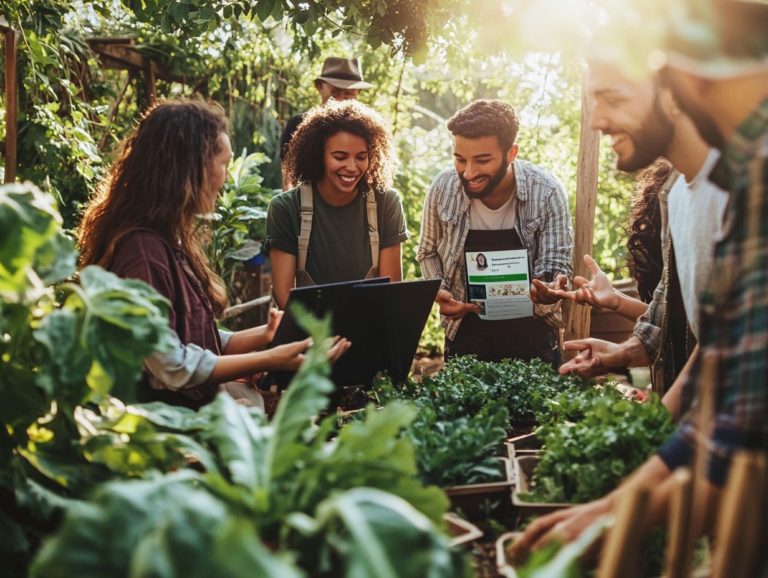70. How to Network with Local Environmental Groups
In today s world, environmental challenges are growing. To tackle them effectively, strong connections within local communities are vital.
Networking is your secret weapon. It helps you amplify your impact as an environmental advocate. This article will guide you in discovering local environmental groups, harnessing online resources, and engaging in local events while offering clear steps to follow.
You ll learn how to approach and collaborate with these organizations. You will also uncover volunteering opportunities and grasp the significant difference that networking can make on your path toward sustainability through impactful messaging.
Dive into the crucial role that networking plays in driving meaningful change for our planet. It fosters community involvement and collaboration.
Contents
- Key Takeaways:
- Why Networking is Important for Environmental Activism
- Finding Local Environmental Groups
- Building Connections with Local Environmental Groups
- Contributing to Local Environmental Groups
- Networking for a Cause: Making a Difference Together
- Frequently Asked Questions
- What are local environmental groups?
- Why is it important to network with local environmental groups?
- How can I find local environmental groups in my area?
- What can I do to network with local environmental groups?
- What are the benefits of networking with local environmental groups?
- How can I contribute to local environmental groups through networking?
Key Takeaways:
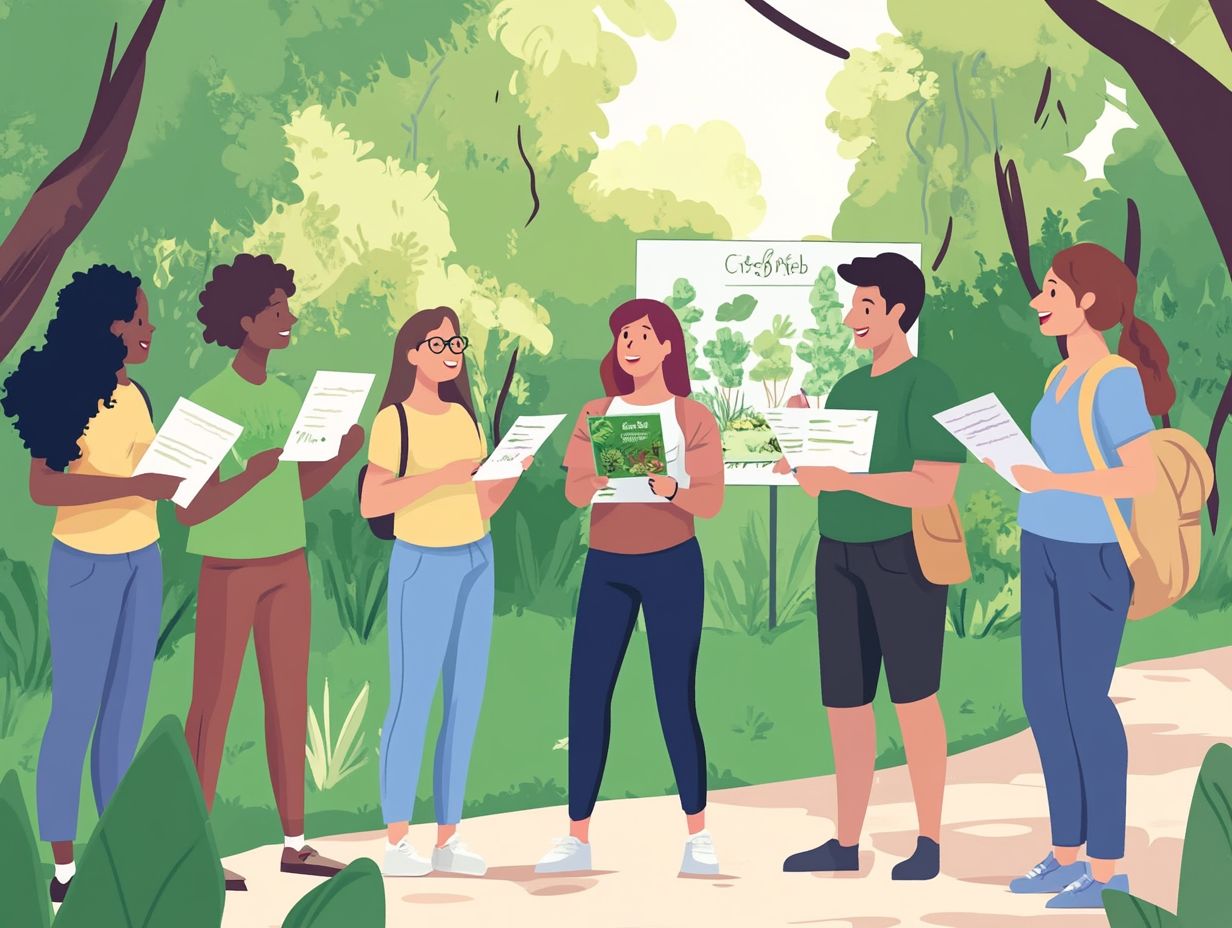
- Network with local environmental groups to make a difference in your community.
- Utilize online resources and attend events to find and connect with local environmental groups.
- Contribute to local environmental groups through volunteering, fundraising, and sharing resources and expertise. Emphasize the big picture of environmental sustainability.
Why Networking is Important for Environmental Activism
Networking is essential in environmental activism. It acts as a pivotal connection point for individuals and organizations dedicated to making a meaningful impact on climate change and promoting climate justice.
Nurturing relationships among diverse stakeholders local communities, climate activists, and prominent organizations like 350.org and Earthjustice enhances effective communication and community-led efforts aimed at addressing urgent environmental challenges. Sharing local stories that resonate is vital.
The chance to share local stories while promoting a global message enables you to take decisive action toward climate justice. It s crucial for anyone involved in environmental advocacy to actively participate in networking activities to drive meaningful change.
Finding Local Environmental Groups
Finding local environmental groups is crucial for cultivating community engagement and collaboration on climate change initiatives. These organizations provide tailored messages and grassroots action opportunities that resonate with your values.
You can uncover and connect with environmental organizations such as the Arbor Day Foundation and Clean Water Action through social media platforms or community bulletin boards. Engaging with these groups enhances your own impact and contributes to collective efforts aimed at tackling local environmental challenges.
Online Resources for Locating Groups
Online resources are helpful for discovering environmental groups. They make it easier to engage with local communities committed to climate justice and sustainability, fostering community involvement.
Beyond the websites of well-known organizations, platforms like Idealist and VolunteerMatch can effectively help you scout volunteer opportunities that align with your specific interests, whether that’s protecting wildlife or championing renewable energy initiatives.
Local community calendars and city government websites often compile a wealth of information on upcoming environmental events, workshops, and meetings. This invites you to participate actively and engage your target audience.
Social media groups and pages, like those on Facebook and Instagram, create an interactive space where you can share experiences, ask questions, and rally support for local projects. This engagement not only enables you but also enhances community involvement in environmental advocacy.
Networking at Local Events
Networking at local events is a powerful way to build relationships with environmental activists and organizations. These gatherings provide a chance to connect with like-minded individuals committed to climate justice.
From workshops to clean-ups, these events are excellent for sharing local stories and messages that resonate deeply with your audience. This boosts engagement and drives action.
You’ll find yourself in enriching environments where you can learn from insightful guest speakers, participate in lively discussions, and explore initiatives focused on environmental preservation. Connecting with others can uncover potential partners for innovative projects addressing local ecological challenges.
These interactions can spark campaigns aimed at educating your community about sustainable practices. This creates a ripple effect of awareness that benefits everyone involved. Essentially, these gatherings are vital for transforming personal passion into collective action, amplifying the efforts of those devoted to creating a healthier planet.
Building Connections with Local Environmental Groups
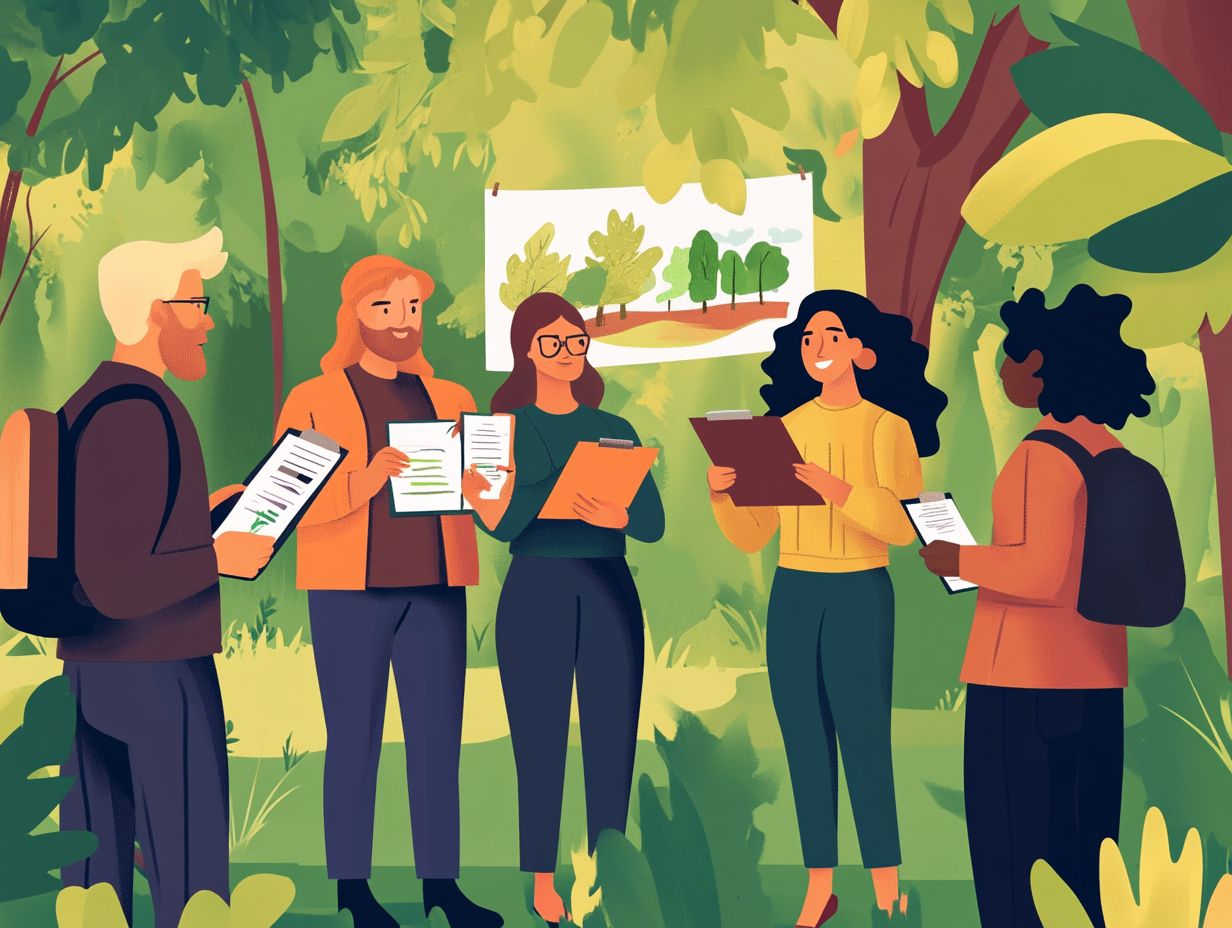
Building connections with local environmental groups enhances the impact of climate action initiatives and fosters community engagement. By forming relationships with organizations like Earthjustice or Defenders of Wildlife, you can collaborate on projects that leverage your unique strengths.
Whether attending meetings, volunteering, or participating in events, effective communication is key to nurturing these relationships. Tailoring messages to resonate with your audience can significantly enhance engagement in environmental advocacy.
Approaching and Introducing Yourself
Approaching representatives of local environmental organizations is a great way to establish a strong foundation for collaboration and public engagement.
To increase the chances of building meaningful connections, take time to research each organization beforehand. Familiarizing yourself with their past projects and current initiatives shows respect and prepares you to ask informed questions.
During interactions, clear communication is essential. Share your own experiences, but listen actively to their insights. Finding shared values builds trust and sets the stage for future collaborations.
By fostering open dialogue and showing commitment to environmental causes, you ll lay the groundwork for relationships that can lead to substantial and positive change, promoting environmental justice.
Collaborating on Projects and Initiatives
Don’t miss the chance to collaborate on exciting projects that make a real difference! Working with local environmental groups boosts your impact and builds community.
By joining forces with organizations like Clean Water Action or the Climate Reality Project, you can engage in campaigns that resonate with your values.
You can collaborate in many ways. This includes local clean-up events and advocacy efforts that promote sustainability.
Participating in educational workshops and tree-planting initiatives helps you learn more about conservation and build relationships.
Volunteer days are a powerful platform for collective action, raising awareness of challenges in your local ecosystems.
Every small effort counts towards our shared goals. Together, communities can foster positive change.
By working hand-in-hand, you can influence policy changes and nurture a more sustainable future for everyone.
Contributing to Local Environmental Groups
Contributing to local environmental groups offers a great opportunity to support sustainability efforts. Engage your community in meaningful actions against climate change and promote environmental justice.
Volunteer your time, share your expertise, or participate in fundraising initiatives. Your support enhances the impact of organizations like Earth Day Network and The Nature Conservancy.
These contributions provide vital resources and foster relationships among stakeholders. Your involvement can truly make a difference.
Volunteering and Fundraising Opportunities
Volunteering and fundraising with local environmental organizations are vital ways for you to engage in community change. Organizations like Defenders of Wildlife and the Arbor Day Foundation rely on volunteers to achieve their goals.
These opportunities let you contribute your unique skills while deepening community engagement. You can participate in clean-up days, educational events, tree-planting, and habitat restoration projects.
These activities allow you to see the impact of your contributions firsthand. Local groups also organize fundraising events that not only support initiatives but foster dialogue around pressing environmental issues.
This involvement nurtures teamwork and builds responsibility. Engaging with like-minded individuals amplifies your voice and helps tackle local environmental challenges.
Sharing Resources and Expertise
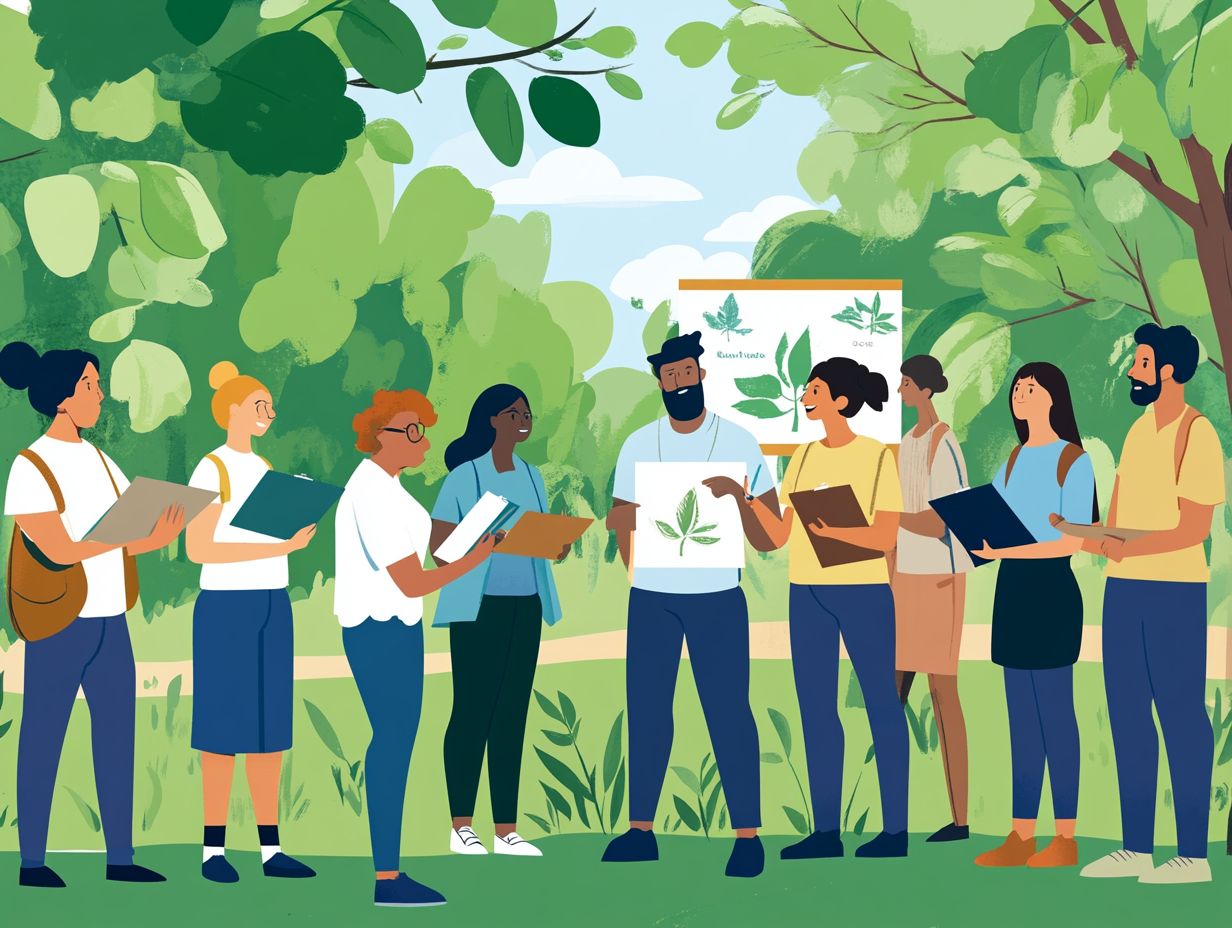
Sharing your resources and expertise with local environmental groups by engaging with local communities can significantly boost their ability to tackle urgent climate challenges and promote sustainability. Whether you’re providing educational materials or offering technical knowledge on renewable energy solutions, you have the power to make a meaningful impact.
In supporting organizations dedicated to climate justice and nature conservation, working together enhances community involvement and elevates the quality of communication between stakeholders and climate activists. This ensures that value-based messages that inspire public engagement truly resonate with the audience.
By volunteering your time or providing actionable advice or leading workshops, you can equip these organizations with crucial skills, such as grant writing the process of applying for funds to support projects or social media strategy, which refers to planning how to use social platforms effectively. For instance, if you’re a graphic designer, you could create visually engaging campaigns that draw in more volunteers. Alternatively, if you have a background in environmental science, you could lead informative sessions explaining local biodiversity.
Mutual sharing strengthens the organizations and community ties while addressing environmental issues and fostering a culture of environmental stewardship. This encourages more residents to engage in advocacy efforts. When you contribute your unique talents, you set off a ripple effect that benefits both local ecosystems and the resilience of the community, ultimately supporting grassroots action.
Networking for a Cause: Making a Difference Together
Networking for a cause enables you to join forces with individuals and organizations, all working towards a significant impact in environmental activism and climate justice. By connecting with a diverse range of stakeholders be it local communities or environmental organizations you have the opportunity to share local narratives and enhance your collective influence on pressing environmental challenges.
Working together not only fosters effective communication but also enables you to engage your target audiences with clear, value-driven messages that encourage environmental sustainability and inspire action for a sustainable future.
Impact of Networking on Environmental Activism
The impact of networking on community-led efforts in environmental activism is truly profound, cultivating relationships that foster collaboration and significantly amplify the reach of these efforts. You can share insights, resources, and local stories that illustrate the ecological significance of engaged individuals, strengthening community involvement and enhancing collective efforts toward climate justice.
Networking enables the exchange of best practices in environmental advocacy and among environmental organizations, promoting effective communication and ensuring that your messages resonate through the use of diverse mediums. This ultimately drives positive change in addressing pressing environmental challenges.
This interconnectedness often leads to successful initiatives that can wield considerable influence over policies and raise awareness. Take, for instance, the collaboration among various environmental groups during the Global Climate Strike organized by Fridays for Future; it demonstrated how unified efforts mobilized millions worldwide, showcasing the impactful messaging and the formidable power of a strong network.
Local groups using social media platforms, where dynamic visuals can amplify messages, have rallied support for renewable energy initiatives and clean energy projects, effectively advocating for policy reforms within their communities.
These examples illustrate that when passionate individuals and organizations committed to positive change unite, their collective voice can bring about tangible shifts in the pursuit of sustainability and environmental equity, promoting environmental justice.
Frequently Asked Questions
What are local environmental groups?
Local environmental groups are organizations made up of individuals who are passionate about protecting and preserving nature conservation efforts in their specific community. These groups work towards fostering a sustainable environment for everyone.
Why is it important to network with local environmental groups?
Networking with local environmental groups allows for collaboration and the sharing of resources, ideas, and strategies to effectively address environmental challenges in the community.
How can I find local environmental groups in my area?
Start by searching online for “local environmental groups near me!” You can also reach out to your city or town’s government office for a list of registered environmental organizations in the area.
What can I do to network with local environmental groups?
Attend events, workshops, and meetings hosted by local environmental groups to get to know members and learn about their initiatives through community engagement. You can also contact them via email or social media to express your interest in working with key individuals and groups.
What are the benefits of networking with local environmental groups?
Networking with local environmental groups can lead to new partnerships and collaborations, increased knowledge and resources while participating in positive and inspiring projects, and a stronger collective voice for environmental advocacy in the community. Join now for amazing opportunities!
How can I contribute to local environmental groups through networking?
By networking with local environmental groups, you can offer your skills, knowledge, and resources to support their initiatives. This can include volunteering, donating, or sharing your expertise on a specific topic.

